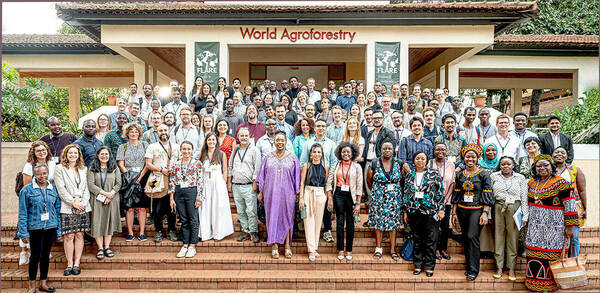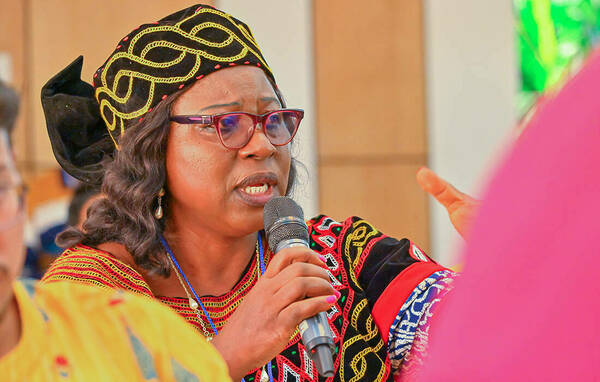Thriving forests are essential for combating climate change by removing carbon from the atmosphere, sequestering it, and enhancing ecosystem resilience. However, an often overlooked aspect of maintaining forest health is supporting the individuals dedicated to their protection. Indigenous Peoples, who constitute six percent of the world's population, are believed to safeguard about 80 percent of the world’s remaining biodiversity. Yet large-scale logging, industrial farming, and mining threaten their rights and these vital lands.
Frontline communities and human rights defenders are crucial for protecting and restoring forests, says Daniel C. Miller, Pulte Institute core affiliated faculty and an associate professor of environmental policy at the Keough School of Global Affairs. “FLARE is committed to supporting these unsung heroes of conservation through rigorous research, cross-regional exchange, and policy engagement.”
FLARE, or Forests and Livelihoods: Assessment, Research, and Engagement — coordinated by Miller and based at the Pulte Institute — is a collaborative hub of scholars, educators, and practitioners from various sectors and disciplines. They unite under a shared vision: to promote the role of forests as pathways to prosperity.
 FLARE’s global outreach is fueled by its annual conferences, including the 2023 event in Nairobi, Kenya, attended by 215 people from 40 countries.
FLARE’s global outreach is fueled by its annual conferences, including the 2023 event in Nairobi, Kenya, attended by 215 people from 40 countries.Indigenous communities strive to maintain their role as stewards of the lands essential to their way of life, advocating for a fair and equitable share of the resources their forests provide. They cultivate a balanced environment, ensuring that forests continue to supply water, food, and shelter. But, as Miller points out, "forces are arrayed against flourishing forest communities in many parts of the world." FLARE is dedicated to supporting these communities and their forests, focusing particularly on marginalized and vulnerable groups in low- and middle-income countries.
Community forests are lands collectively held by Indigenous Peoples, where resources are deeply intertwined with their identity and culture. In recent years, there has been a growing recognition of these local communities' crucial role in managing and conserving forests, but acknowledgment often lacks substance.
An example is the Ogiek community in Kenya, an Indigenous group living in the Mau Forest. Human rights violations have marked the Kenyan government's efforts to protect this forest. Over 100,000 people have reportedly been evicted, with their homes destroyed by the country’s forest service. Despite the African Court on Human and Peoples’ Rights affirming the Ogiek’s Indigenous status and land ownership, the Kenyan government has continued to use conservation as a pretext for their removal.
Miller also raises a significant concern that carbon offsets may further disempower communities like the Ogiek while having minimal impact on climate change. For instance, Blue Carbon, a company based in the United Arab Emirates, has acquired forested land equivalent to the size of the United Kingdom across five African nations. The company aims to create carbon credits to sell to businesses and governments to offset their climate pollution, potentially undermining local communities in the process.
“I am very concerned about such land grabs,” Miller says. “At worst, they allow wealthy countries to continue to burn planet-warming fossil fuels while taking land and life from people who have lived there for generations. Such offsets are often imposed without consulting communities and have a limited impact on climate change.”
Miller emphasizes the essential role of scholars, educators, and activists in tackling these challenges and the need for an evidence-based platform that empowers communities to advocate for themselves. FLARE's multidisciplinary approach brings together economists, anthropologists, geographers, foresters, and biologists, all dedicated to understanding and promoting the coexistence of people and forests.
THE BEGINNING
FLARE's origins can be traced back to the pioneering work of Elinor Ostrom, the first woman to receive the Nobel Prize in Economic Sciences in 2009. Her research led to the creation of the International Forestry Resources and Institutions Network, which focused on local communities' use, management, and governance of tropical forests. Following Ostrom's passing in 2012, her collaborator Arun Agrawal, a professor at the University of Michigan, launched FLARE. Agrawal's esteemed reputation in the field of forest policy, combined with Ostrom's legacy, provided immediate credibility to the network, which has since evolved into a significant community of practice.
 FLARE, based at the Pulte Institute for Global Development and coordinated by core affiliated faculty member Daniel C. Miller (center left), focuses on research, policy development, and community engagement to protect the world’s forests. The organization's annual conferences serve as a platform for academic discussions and addressing critical issues such as climate change, environmental justice, and Indigenous rights.
FLARE, based at the Pulte Institute for Global Development and coordinated by core affiliated faculty member Daniel C. Miller (center left), focuses on research, policy development, and community engagement to protect the world’s forests. The organization's annual conferences serve as a platform for academic discussions and addressing critical issues such as climate change, environmental justice, and Indigenous rights.Miller draws inspiration from the work of Ostrom and Agrawal, who demonstrated how communities can effectively devise innovative solutions to govern their forests and other resources. Today, he extends their work by exploring the influence of external funders on local collective action and outcomes in community forests.
Growing up on a goat farm in northern Illinois within a culturally diverse environment significantly shaped Miller's perspective on environmental justice, human rights, and conservation. His father worked as a chef at Northern Illinois University, and international students frequently lived with the Miller family, enriching his early experiences.
“When I was a kid, we always had visitors, and it was formative for me to spend time with people from different cultures,” Miller says. “Most of my professional work has been abroad, and I can trace the origins of that interest back to my experiences on the farm.”
After graduating from college, Miller joined a community development non-governmental organization in Indonesian Borneo through Stanford University’s Volunteers in Asia program. There, he witnessed firsthand the challenges Indigenous communities face due to environmental degradation, market pressures, and cultural shifts. As a graduate student, Miller focused on the governance of protected areas in West Africa's W National Park and its interaction with international aid, saying, "Such programs often fail to adequately engage with local political dynamics."
Miller's career took a pivotal turn when he joined the MacArthur Foundation's conservation and sustainable development program. This role and his collaboration with Agrawal — who later supervised his Ph.D. at the University of Michigan — gave him a comprehensive view of the conservation challenges he had encountered in Indonesia. A subsequent position at the World Bank further expanded his understanding of conservation financing and its relatively minor role in mainstream global agendas.
WORLDWIDE RESEARCH
Miller's work at the University of Notre Dame addresses practical issues, highlighting the importance of forests in development discourse and policy. He underscores the crucial role of international conservation support and effective local governance structures, which he refers to as the "missing middle" in aid distribution.
 Honourine Wainachi Nengtoh, an environmental activist and member of Cameroon’s parliament, spoke at FLARE’s 2023 conference in Nairobi. She is now leveraging FLARE data to empower women in Cameroon by helping them secure forest land rights.
Honourine Wainachi Nengtoh, an environmental activist and member of Cameroon’s parliament, spoke at FLARE’s 2023 conference in Nairobi. She is now leveraging FLARE data to empower women in Cameroon by helping them secure forest land rights.Under Miller's guidance, FLARE explores the complex relationship between forests and poverty, aiming to understand forests' multifaceted role in supporting livelihoods. FLARE-supported research often uncovers trade-offs among various sustainability goals, highlighting the challenges in achieving balanced outcomes.
“At a time when forests are gaining unprecedented attention in international policy, there is a need for careful consideration of both conservation and livelihood interests,” Miller says. “The FLARE network’s role is to facilitate discussions among diverse stakeholders, including scholars, donors, practitioners, and communities, while keeping the spotlight on the myriad of benefits forests have for human well-being, especially for the most marginalized.”
FLARE also fosters a supportive and collegial environment for its 1,300-plus members, enabling meaningful contributions regardless of their discipline or career stage. A notable example is Beverly Ndifoin, a Keough School Master of Global Affairs student from Cameroon. Her work with FLARE accentuates the network's capacity to support advocacy efforts.
Ndifoin emphasized that most of the country's small-scale farmers are women, and data collection and analysis "give them a voice in decision-making processes."
“FLARE helps my mother (Honourine Wainachi Nengtoh, an environmental activist and member of Cameroon’s parliament) gather evidence-based information that she can use,” Ndifoin explained. “One challenge is that researchers often assume policymakers read the journals where they publish, but they don’t. She’s now using results to help women in Cameroon benefit from having forest land rights.” These efforts are particularly crucial as the country endures a devastating civil war that has claimed over 6,000 lives and left nearly four million people reliant on humanitarian aid.
FLARE's annual conferences propel its global reach, such as the 2023 event in Nairobi, which attracted 215 attendees from 40 countries. This event provided a forum for academic exchange and underscored a commitment to tackling critical issues like climate change, environmental justice, and Indigenous rights.
"The true value of FLARE lies in its network of people," says Miller. "Many of the world's leading researchers in these fields contribute substantial evidence on effective strategies for supporting forests and communities. This research and the exchange platform FLARE offers empower frontline communities to advocate for their rights and reap benefits that allow them to thrive while preserving forests."